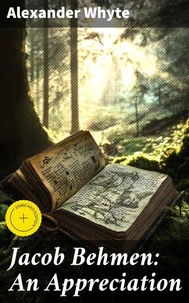Sir Thomas Browne and his 'Religio Medici': An Appreciation. Unveiling the Depths of Browne's 'Religio Medici'
Par :Formats :
Disponible dans votre compte client Decitre ou Furet du Nord dès validation de votre commande. Le format ePub est :
- Compatible avec une lecture sur My Vivlio (smartphone, tablette, ordinateur)
- Compatible avec une lecture sur liseuses Vivlio
- Pour les liseuses autres que Vivlio, vous devez utiliser le logiciel Adobe Digital Edition. Non compatible avec la lecture sur les liseuses Kindle, Remarkable et Sony
 , qui est-ce ?
, qui est-ce ?Notre partenaire de plateforme de lecture numérique où vous retrouverez l'ensemble de vos ebooks gratuitement
Pour en savoir plus sur nos ebooks, consultez notre aide en ligne ici
- Nombre de pages145
- FormatePub
- ISBN406-4-06-624265-7
- EAN4064066242657
- Date de parution09/12/2019
- Protection num.Digital Watermarking
- Taille658 Ko
- Infos supplémentairesepub
- ÉditeurGOOD PRESS
Résumé
In "Sir Thomas Browne and his 'Religio Medici': An Appreciation, " Alexander Whyte embarks on a profound exploration of one of the 17th century's most enigmatic literary figures, Sir Thomas Browne. Delving deep into Browne's magnum opus, 'Religio Medici, ' Whyte examines the intricate interplay between faith and reason that permeates the text. His literary analysis showcases Browne'Äôs unique prose style, characterized by baroque language and reflective nostalgia, which sets the backdrop against a tumultuous period of scientific discovery and religious transformation.
Through Whyte's discerning lens, the reader appreciates how Browne's philosophical inquiries resonate with contemporary spiritual dilemmas, as he deftly integrates personal reflection with broader existential themes. Alexander Whyte, a Scottish theologian and scholar renowned for his eloquent writings on various literary and theological subjects, was deeply influenced by the complexities of faith in a rapidly changing world.
Whyte'Äôs own intellectual journey, marked by an appreciation of antiquity and a commitment to theological inquiry, provides the impetus for his examination of Browne. This admiration for Browne's synthesis of science and spirituality illustrates Whyte's goal of fostering a renewed dialogue on the relevance of such contemplative works in modern philosophical thought. This book is a compelling read for scholars, students, and literature enthusiasts alike, offering insights that illuminate Browne'Äôs enduring legacy.
Whyte skillfully articulates the profound implications of Browne's reflections on the human experience, making it an essential addition to the library of anyone interested in the intersection of literature, philosophy, and religious thought.
Through Whyte's discerning lens, the reader appreciates how Browne's philosophical inquiries resonate with contemporary spiritual dilemmas, as he deftly integrates personal reflection with broader existential themes. Alexander Whyte, a Scottish theologian and scholar renowned for his eloquent writings on various literary and theological subjects, was deeply influenced by the complexities of faith in a rapidly changing world.
Whyte'Äôs own intellectual journey, marked by an appreciation of antiquity and a commitment to theological inquiry, provides the impetus for his examination of Browne. This admiration for Browne's synthesis of science and spirituality illustrates Whyte's goal of fostering a renewed dialogue on the relevance of such contemplative works in modern philosophical thought. This book is a compelling read for scholars, students, and literature enthusiasts alike, offering insights that illuminate Browne'Äôs enduring legacy.
Whyte skillfully articulates the profound implications of Browne's reflections on the human experience, making it an essential addition to the library of anyone interested in the intersection of literature, philosophy, and religious thought.
In "Sir Thomas Browne and his 'Religio Medici': An Appreciation, " Alexander Whyte embarks on a profound exploration of one of the 17th century's most enigmatic literary figures, Sir Thomas Browne. Delving deep into Browne's magnum opus, 'Religio Medici, ' Whyte examines the intricate interplay between faith and reason that permeates the text. His literary analysis showcases Browne'Äôs unique prose style, characterized by baroque language and reflective nostalgia, which sets the backdrop against a tumultuous period of scientific discovery and religious transformation.
Through Whyte's discerning lens, the reader appreciates how Browne's philosophical inquiries resonate with contemporary spiritual dilemmas, as he deftly integrates personal reflection with broader existential themes. Alexander Whyte, a Scottish theologian and scholar renowned for his eloquent writings on various literary and theological subjects, was deeply influenced by the complexities of faith in a rapidly changing world.
Whyte'Äôs own intellectual journey, marked by an appreciation of antiquity and a commitment to theological inquiry, provides the impetus for his examination of Browne. This admiration for Browne's synthesis of science and spirituality illustrates Whyte's goal of fostering a renewed dialogue on the relevance of such contemplative works in modern philosophical thought. This book is a compelling read for scholars, students, and literature enthusiasts alike, offering insights that illuminate Browne'Äôs enduring legacy.
Whyte skillfully articulates the profound implications of Browne's reflections on the human experience, making it an essential addition to the library of anyone interested in the intersection of literature, philosophy, and religious thought.
Through Whyte's discerning lens, the reader appreciates how Browne's philosophical inquiries resonate with contemporary spiritual dilemmas, as he deftly integrates personal reflection with broader existential themes. Alexander Whyte, a Scottish theologian and scholar renowned for his eloquent writings on various literary and theological subjects, was deeply influenced by the complexities of faith in a rapidly changing world.
Whyte'Äôs own intellectual journey, marked by an appreciation of antiquity and a commitment to theological inquiry, provides the impetus for his examination of Browne. This admiration for Browne's synthesis of science and spirituality illustrates Whyte's goal of fostering a renewed dialogue on the relevance of such contemplative works in modern philosophical thought. This book is a compelling read for scholars, students, and literature enthusiasts alike, offering insights that illuminate Browne'Äôs enduring legacy.
Whyte skillfully articulates the profound implications of Browne's reflections on the human experience, making it an essential addition to the library of anyone interested in the intersection of literature, philosophy, and religious thought.





